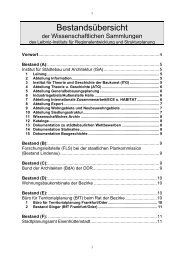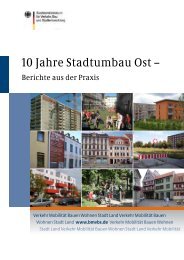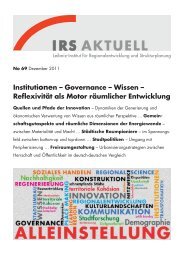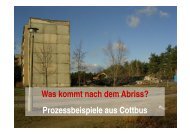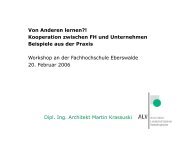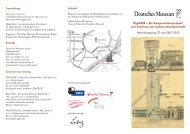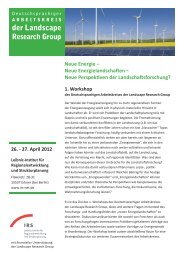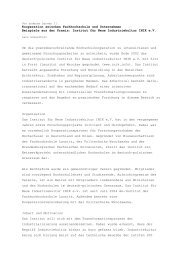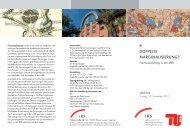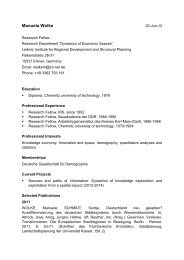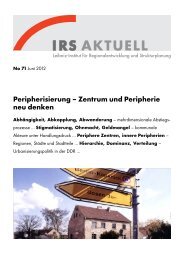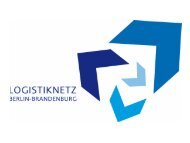COMMIN flyer - DEX
COMMIN flyer - DEX
COMMIN flyer - DEX
Create successful ePaper yourself
Turn your PDF publications into a flip-book with our unique Google optimized e-Paper software.
<strong>COMMIN</strong> project partners<br />
<strong>COMMIN</strong> incorporates 28 partners from eleven coun tries:<br />
a consortium of universities, state and administrative<br />
bodies, ministries and local institutions, non-university<br />
institutes and private companies from Belarus, Denmark,<br />
Estonia, Finland, Latvia, Lithuania, Norway, Poland, Russia,<br />
Sweden and Germany combining their manifold qualifi<br />
cations and interests.<br />
Scientists and practitioners work hand in hand on experience<br />
transfer and exchange, training and knowledge input<br />
towards implementation in day–to-day policy making<br />
and planning practice.<br />
CONTRIBUTE YOUR KNOWLEDGE<br />
TO THE COMMON LANGUAGE –<br />
SPEAK SPATIAL!<br />
<strong>COMMIN</strong> – the Baltic spatial conceptshare –<br />
be part of the experience!<br />
precise understanding of other Baltic countries’<br />
planning concepts<br />
helpful and complete translations and explanations<br />
effi cient transnational communication<br />
mutual understanding and common knowledge levels<br />
PROJECT REGION<br />
<strong>COMMIN</strong> Project Co-ordination<br />
Academy for Spatial Research and Planning<br />
Dennis Ehm<br />
Hohenzollernstr. 11<br />
D- 30161 Hannover<br />
phone. +49 5 11 3 48 42 49<br />
fax. +49 5 11 3 48 42 41<br />
email. commin@arl-net.de<br />
Project part-fi nanced<br />
by the European Union<br />
EXPERIENCE EXCHANGE<br />
ON SPATIAL DEVELOPMENT<br />
AND SPATIAL PLANNING!
What is the <strong>COMMIN</strong> project?<br />
The <strong>COMMIN</strong> project works towards a common understanding<br />
of spatial development and spatial planning in<br />
the Baltic Sea Region. It aims to improve transnational<br />
experience exchange and to make transnational communication<br />
more effi cient.<br />
<strong>COMMIN</strong> makes knowledge available, creates a base for<br />
communication between equals, qualifi es practitioners,<br />
and organises experience exchange in the fi eld of spatial<br />
development.<br />
<strong>COMMIN</strong>: Promoting Spatial Development by<br />
Creating COMmon MINdscapes<br />
‘Mindscapes’ combines mind and landscapes. ‘COMmon<br />
MINdscapes’ stands for common ground and<br />
mutual understanding – a shared comprehension of<br />
spatial development terminology in all <strong>COMMIN</strong><br />
countries.<br />
<strong>COMMIN</strong>’s objectives are<br />
to enable transnational partners to communicate<br />
effectively<br />
to facilitate future transnational projects and<br />
investments<br />
to qualify professionals<br />
to make experience publicly available online<br />
to transfer policy methods and to promote innovative<br />
approaches<br />
The <strong>COMMIN</strong> project runs from September 2004 till<br />
August 2007. Coordinator is the Academy for Spatial<br />
Research and Planning in Hanover, Germany.<br />
The <strong>COMMIN</strong> Work packages<br />
<strong>COMMIN</strong> is structured in three main work packages that<br />
are strongly interlinked and interactive, e.g. thematic<br />
workshops will produce recommendations which will<br />
then support measures of the other work packages and<br />
be made publicly accessible online.<br />
WORK PACKAGE 1: internet portal on spatial<br />
development in the Baltic Sea Region<br />
The main tool of the <strong>COMMIN</strong> project is a publicly<br />
accessible and up-to-date internet portal to promote<br />
the transnational information exchange for all involved<br />
in spatial planning and development throughout<br />
the Baltic Sea Region.<br />
WORK PACKAGE 2: advanced training network<br />
The project will develop an advanced training network<br />
on spatial planning and regional development<br />
in the Baltic Sea Region. To enhance capacity building<br />
amongst planners and to forge links, <strong>COMMIN</strong> will<br />
run eight three-day seminars and two summer<br />
schools.<br />
WORK PACKAGE 3: transnational exchange of<br />
innovative spatial development approaches<br />
An analysis of current and fi nalised INTERREG projects<br />
will provide experiences made and guidelines<br />
for future transnational projects and policies.<br />
Thematic workshops on Trans-European Transport<br />
Networks (TEN-T) and Integrated Costal Zone Manage<br />
ment (ICZM) will bring knowledge and experience<br />
together. Elaborated recommendations will<br />
help to better meet the future transnational challenges<br />
in these fi elds.<br />
The <strong>COMMIN</strong> tool: Website and online glossary<br />
The main website language will be English, and updated<br />
national information and practical examples will also<br />
be provided in eleven languages! Project partners from<br />
eleven countries will introduce their planning and administrative<br />
systems they are embedded in supported by<br />
practical examples, as well as national glossaries on spatial<br />
planning terms. Results and material of all work<br />
packages will be made publicly available.<br />
The <strong>COMMIN</strong> website is designed as a dialogue platform,<br />
its core being a constantly growing online glossary<br />
of planning terminology. It will develop a key planning<br />
terminology database in English: the most important<br />
planning terms from eleven national languages will be<br />
harmonised and expressed as common English terms,<br />
based on a shared understanding and a generally accepted<br />
reliable defi nition. This spatial development terminology<br />
glossary promotes the mutual understanding within<br />
the Baltic Sea Region and will be the very fi rst of its<br />
kind.<br />
The <strong>COMMIN</strong> glossary will sort, defi ne, organise, connect<br />
and structure planning terminology for mutual understanding<br />
in a transnational approach for the Baltic Sea<br />
Region.The glossary lives from input, discussion and<br />
idea exchange. External input is vital to steadily improve<br />
it and make it a vivid and reliable resource for scientists<br />
and practitioners, planners and developers as well as future<br />
EU policy development. It will become an effective<br />
communication tool for transnational cooperation, planning<br />
and development.



